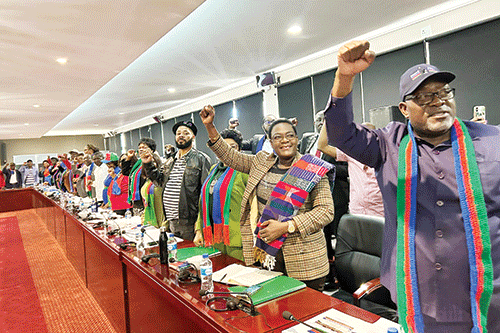As the country prepares for crucial national elections in November, the ruling party has expressed concern about the current political atmosphere, including threats from political opponents.
Netumbo Nandi-Ndaitwah, the Swapo vice president and the party’s presidential candidate, hinted at a plot by “enemies of democracy” who, she said, are hard at work to undermine former liberation movements in southern Africa to the detriment of its people.
She made these remarks during the opening of the first ordinary central committee meeting under her watch yesterday in Windhoek.
Election years usually see a surge in political campaigning, rallies and debates as candidates vie for public support and attempt to sway voters.
Nandi-Ndaitwah expressed concern about verbal threats directed at Swapo and the nation at large by some leaders of political parties.
She interpreted statements suggesting retaliation against Swapo as a direct call for an act of war and military confrontation.
The vice president further expressed concern about an incident in which a party member was assaulted during a campaign event at the Mix settlement in Windhoek last weekend.
The perpetrator, who was seen in widely circulated videos calling Swapo leaders “liars” before slapping a party member, was reportedly rewarded with money by political activist Michael Amushelelo, a leader of the opposition Namibia Economic Freedom Fighters (NEFF).
Interference
Beyond the alleged threats, the German embassy also came under fire from the ruling party.
Nandi-Ndaitwah was disappointed with how the German embassy was interfering in the State matters of the country.
This comes after discussions hosted by the German embassy, where the leader of the Independent Patriotic Change (IPC), Panduleni Iitula, attended to discuss Namibia-EU relations.
Nandi-Ndaitwah further criticised the embassy for suggesting that Iitula is widely projected to be the next president of Namibia.
“What a diplomatic statement, particularly from a country with whom we still have a serious pending issue,” Nandi-Ndaitwah remarked.
The two countries are yet to reach a conclusion on matters regarding genocide reparations.
While acknowledging that it may not be wrong for a diplomat to meet leaders or members of opposition parties, the Swapo leader said the issue lies in their discussions of State matters and direct involvement in internal politics.
Nandi-Ndaitwah described this as a highly questionable form of diplomacy.
The presidential candidate also hinted there may be a strategy to interfere in the country’s elections, stating, “The statement has the scent of an element of regime change”.
Before concluding her speech, Nandi-Ndaitwah panned political parties who have allegedly hired foreign companies to run their elections.
“If you do not trust Namibians to run your campaign, how can you trust them to run the country with you?” she questioned.
On Wednesday, minister of international relations Peya Mushelenga summoned envoys from the European Union delegation and the German embassy, following the aforementioned engagement with Iitula.
Mushelenga cautioned the EU entities to respect the sovereignty of Namibia, despite it being a small state.
No violence
Approached for a comment, veteran diplomat Tuliameni Kalomo said ambassadors are free to interact with citizens and opposition parties, especially those represented in Parliament, but they are not free to discuss State policies with opposition parties.
“That is the role of government,” he said.
Kalomo is of the opinion that if the meeting held was on issues relating to the country, then it can be regarded as a diplomatic irregularity.
“It is not normal for diplomats, especially representing such key countries, to meet opposition, and he is not even an official opposition for that matter. This also happened at the beginning of an election campaign, and this will be regarded in many diplomatic histories as direct interference in the domestic affairs of Namibia,” Kalomo opined.
Speaking to this paper, political analyst Natjirikasorua Tjirera condemned political violence, stating that while the assault of a Swapo member may be taken lightly, it could also lead to anarchy and lawlessness in the state.
“This shows the level of politics in Namibia – unfortunately,” said Tjirera.
He called out political leaders who take pride in violence, saying, “All political parties should engage their members to refrain from violence, particularly the NEFF for rewarding perpetrators of political violence. It seems like whoever attacks a member of another party will be rewarded, which is very irresponsible for a political movement”.
Regarding the EU, Tjirera disapproved of the EU delegation meeting with a political movement, stating, “A relationship between governments should be guided by international relations between the two governments. IPC is not the government and, therefore, should not be engaged on government issues.”
Tjirera further claimed Germany has no moral grounds to engage with individual parties in Namibia.
“Germany is an unprecedented criminal state that has killed Namibians in masses and failed to take responsibility. Not only that, but Germany openly supports genocide in Palestine. It is unfortunate that these diplomats have decided to engage with an individual political party,” said Tjirera.
In a statement over the weekend, IPC stated that its two leaders, Panduleni Iitula and his deputy Trevino Forbes, attended a lunch, hosted by the German ambassador, Thorsten Hutter, at the ambassador’s residence in Windhoek.
Various European ambassadors, including those from Portugal, Spain, France, the EU and Finland, were in attendance.
“In diplomatic terms, such an honour is a significant political occasion in diplomatic circles, especially in an election year when envoys of a bloc of countries seek the views of stakeholders,” the statement said.
It further indicated that the meeting was to carefully assess the political situation of the country to inform the sending country’s expectations and predict possible outcomes of the elections as usually done by ambassadors as per the instructions of their country.
“This is regarded as probably a turning point or precursor of a changing landscape at a historical level,” said the statement.


